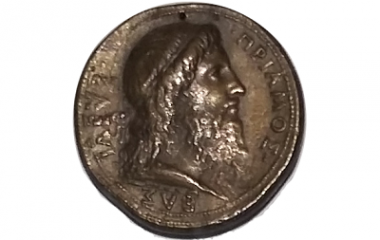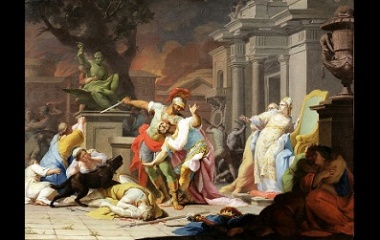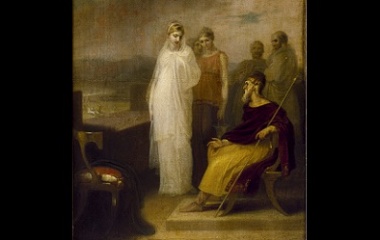- Pronunciation: pr-EE-am
- Origin: Greek
- Role: King
- Symbols: Troy
- Children: Hector, Paris
- Siblings: Hesione
- Other Names: Podarces
Who Is Priam?
In Greek mythology, Priam was the last king of Troy. He ruled the city during the Trojan War and had ties to both its beginning and end. His myth attracts pity from many who hear it and serves as a reminder that family is the most important aspect of life.
Origins
Priam was the youngest son of King Laomedon. His name at birth was Podarces. While he was still a child, his father promised his sister Hesione in marriage to Hercules, the great Greek hero. However, the king broke his promise and, in an act of revenge, Hercules attacked Troy and killed all of King Laomedon’s sons, except for Podarces, who saved himself by offering Hercules a golden veil. He was captured and sold into slavery. Luckily though, Hesione purchased him at the slave market and changed his name to Priam to shield his true identity.
When he was still a young child, Priam was placed on the throne of Troy by Hercules. He grew into his role as king gracefully and proved to be more than capable of the responsibility. He was known as an honest ruler as he expanded Trojan rule and brought prosperity to the people. His true test as king, however, wouldn’t come until many years later.
Legends and Stories
The myth of Priam is full of sadness and tragedy. His life was full of grief and mourning, from his early childhood until his last day, as demonstrated by the following tales.
The Beginning of War
The well-known Greek warrior, Hercules, had kidnapped Hesione. Because she had once saved Priam, he felt compelled to do the same for her. Unable to make the journey on his own, he sent his son, Paris, to conquer the quest. But instead of bringing back Hesione, Paris captured Helen, the wife of the King of Sparta.
The leaders of Greece were furious with Paris and King Priam. This signified the beginning of the Trojan War between the Greeks and Trojans, which would last for 10 years, resulting in tremendous loss of life on both sides. By the time the war started, Priam was no longer the young warrior he once was. He counted on his sons to carry out the war in his honor. This would have dire consequences for the king.
The Death of Hector
As the Trojan War progressed, Priam would be continuously pushed to breaking point as more and more of his sons were killed in battle; he witnessed many of the deaths firsthand. Several of his daughters were taken prisoner as well.
Towards the end of the war, Achilles killed Hector, heir to the throne. This devastated Priam, and the loss was made even worse when Achilles tied Hector’s body to a chariot and disrespected it by dragging it in circles through the mud and dirt in front of the city.
Against his wife’s wishes, Priam approached Achilles and begged him to release Hector’s body to him. Achilles laughed in the old king’s face but changed his mind when Priam broke down in front of him, explaining all that he had lost through his sobs. This was a major turning point for Achilles, who was not associated with pity. Achilles released Hector’s body to the king and agreed to a temporary truce so that a proper burial could take place.
It is after this truce that the famous story from the Trojan War takes place. The Trojans began to think that they had won the war and as they celebrated, they discovered a large wooden horse left outside the city gates. Casandra, one of Priam’s daughters, warned the authorities that there were troops hidden inside the horse, but her prophecy wasn’t taken seriously. The horse was brought inside the city walls, the hidden troops attacked, and the Trojans lost the war as a result.
Priam’s Final Day
Neoptolemus was a brutal fighter during the Trojan War. He was also the son of Achilles. As the war was coming to an end and the fall of Troy was inevitable, Priam witnessed Neoptolemus killing one of his sons, Polites. Priam, though old and frail, was overcome with anger and hurled a spear at the warrior. His throw was too weak, though, and Neoptolemus found the act amusing. He then dragged the king to a family alter and killed him, symbolizing the final fall of all that Troy had left.
Family
Priam had a large family, including several wives and a long line of offspring. His first wife, Arisbe, gave birth to Aesacus, Priam’s first son. Aesacus did not live to see the Trojan War. Priam divorced Arisbe to wed Hecuba. He had several other wives as well, resulting in the birth of 50 sons along with several daughters. One of his daughters, Cassandra, had the ability to see into the future and warned her father about the destruction of the city. Hector was the first son born of Hecuba, making him the heir to the throne and very dear to Priam’s heart. Another son who would play a large role in Priam’s fate was Paris, who was responsible for the start of the Trojan War.
Appearance
Priam is often shown as an elderly man, late into his reign. Many artistic representations of him show him begging Achilles’ for Hector’s body. In these images, he appears worn and hopeless. Other common representations of Priam show him in his last moments, with Neoptolemus standing over him.
Symbology
Priam’s legacy does not leave behind many symbols. Instead of being associated with his great city, he is instead forever linked to the fall of it, which was caused by his own son. Priam gave everything he had, including his family and his own life, in an attempt to save Troy but he was no match for his opponents. Most artistic representations of the king refer to the moment that showed Priam’s vulnerability. When he had to beg for his son’s body, he was no longer seen as a respected king. While Priam ruled a magnificent city for decades, he is now associated with the negative moments of his life.










